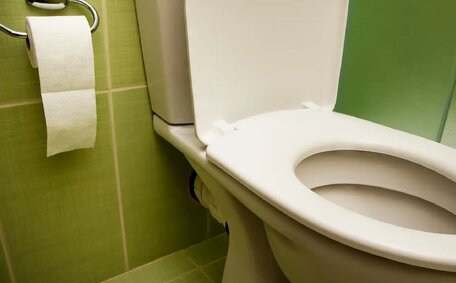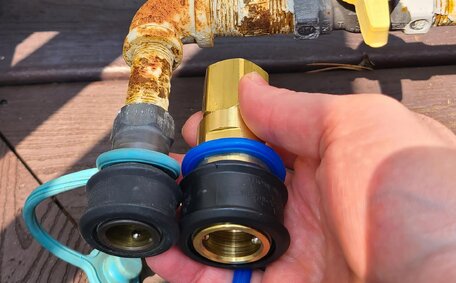Introduction: The Relationship Between Blocked Drains and Septic Tanks
Understanding the critical connection between blocked drains and septic tank issues is essential for homeowners. When drains become clogged, they can prompt issues, allowing waste to seep back up from the septic tank where it shouldn’t. Conversely, a faulty septic system can cause wastewater to flow back into drains, resulting in blockages.
At Ryde Plumbing, We know that a blocked septic and other drainage issues often intertwine.
This piece sheds light on how to fix dilemmas rooted in the causes, signals, and remedies for a clogged septic tank system. We’ll provide strategies for maintaining effective drains and septic systems. Our goal is to clarify this interplay because Knowing the signs and appropriate responses is advantageous.
How Does a Septic System Work and Connect to Drains
Septic systems, integral to home drainage, serve as on-site sewage treatment facilities for properties outside municipal sewer networks. They comprise two main components for processing wastewater:
- The septic tank leach drain - A buried, watertight vessel, the septic tank gathers all your home’s wastewater. Solid waste descends into the tank, settling as sludge while lighter materials like fats and oils surface as scum, both necessitating the tank to be pumped out eventually. As the middle layer partially clears, it passes through an effluent filter, moving towards where your drainage field is positioned.
- The drainage field - Effluent from the septic tank reaches perforated pipes in gravel trenches, dispersing the water across your property’s leach field. Here, filtered water seeps into the surrounding soil, undergoing natural bacterial purification before rejoining the local water cycle.
Wastewater from flushing the toilet, showering, dishwashing, or using the sink moves seamlessly to the septic tank, where it joins the property’s sewer system without backflow incidents.
Inside the septic tank, natural processes work to break down wastewater contaminants, ensuring effluent can safely move through your system’s drains and function effectively. Periodically, solids accumulating as sludge at the bottom must be addressed to prevent them from backing up into your pipework.
The clarified liquid waste continues to the main drain, where underground dispersion allows soil microbes to provide final treatment before the water re-enters the local groundwater supply.
A functional link between household drains and the septic tank facilitates uninterrupted operation of your sewage system, free from blockages. If blockages or difficulties arise, Prompt action is crucial in preventing unhealthy and perilous backflows into your home.
Common Causes of Blocked Drains Related to Septic Tanks
There are several most common septic tank issues that can be connected to causes of blocked drains:
- Flushing foreign objects - Things like wet wipes, feminine hygiene products, cotton swabs, dental floss, condoms, and cat litter are foreign objects that can clog pipes leading to and from the septic tank.
- Heavy rainfall - Excessive stormwater or groundwater can raise water levels in the septic system, overloading the drain field, a situation common post-flood.
- Invasive tree roots - Tree roots attracted to moisture and nutrients can grow into and block your sewer line and the septic system.
- Incorrect drain slope - Inadequate sloping in pipes can cause slow drainage and eventually lead to blockages.
- Overuse of water - Overloading the system with excessive wastewater can lead to sewage problems, potentially surfacing in your home through the drains.
- Ageing system issues - Components like cracked pipes could also cause wastewater to slow down drain flow, back up into your tank, or a saturated drain field losing absorptive capacity.
- Sludge accumulation - Excessive solids can block your tank, affecting the inlet and outlet baffles’ function, especially if not regularly emptied.
Signs of a sewer blockage, like gurgling noises, stagnant water, or slow drainage, should be seen as indicators of an obstruction related to your septic system. Contact Ryde Plumbing immediately if you notice blocked drains, water pooling near septic tank, sewage odours, or other red flags that your system requires attention.
Signs Your Drain is Blocked Due to Septic Tank Issues
There are several signs that indicate your drain may be blocked due to problems with your septic tank or system:
- Slow draining sinks or toilets - If it takes longer than usual for water to drain or empty, there could be a clog in the pipes leading to or from the septic tank.
- Gurgling sounds from drains - Bubbling or unusual drain noises can occur when wastewater and sewage is backing up due to a blockage.
- Sewage odours - Foul smells inside or outside your home suggest a sewage backup and drainage issues.
- Wet spots or standing water - Near your septic tank or drain field could indicate an overflow or broken component flooding a blocked system.
- Pooling water near foundations - Groundwater saturation from a clogged drain field on your property could cause water pooling and potential flooding at your home’s exterior walls or basement.
- Difficulty flushing waste down your toilet - Problems fully evacuating waste from a toilet bowl can mean a blockage in your drainage plumbing or septic connection.
Disregarding these signs might suggest overlooked septic system issues that require immediate action. Blocked drains related to septic tanks can initiate unhealthy conditions where sewage can back up, causing expensive water damage, foul stenches, and plumbing headaches.
Contact the experts at Ryde Plumbing if you suspect a blocked drain associated with septic issues - we have the skills and experience to diagnosis and resolve this frustrating problem.
Troubleshooting and Clearing Septic-Related Drain Blockages
If you suspect your blocked drain is related to septic tank issues, there are some initial troubleshooting steps you can try before calling a professional:
- Reduce water usage - Limit shower length, dishwasher, and washing machine cycles, etc to slow flow into the septic system.
- Use a plunger - Equip yourself with rubber gloves, prepare, and make an attempt clear of a few toilets and sink drains that may display slight blockages.
- Consider the vinegar and baking soda method - donning protective apparel, disperse one-two potent mixture down drains to dissolve organic buildup.
- Use a drain snake - Insert the flexible auger down pipes to physically remove debris.
- Examine external lines - Inspect the drainage field for signs of flooding, unpleasant smells, or excessive moisture.
However, we strongly discourage using harsh chemical concoctions, as they can make a significant impact, negatively affecting your plumbing system. Evade direct contact by entering the septic tank, as perilous gases and oxygen scarcity pose significant health risks.
For severe blockages or confirmed septic-related clogs, entrust the drain cleaning professionals at Ryde Plumbing. Safeguard your home, health, and investment with our rapid response to any concerns emerging from your drain network or the coming drain of septic malfunctions.
Our crew have the high-pressure jetting equipment, CCTV drain inspections, vacuum trucks, and expertise to troubleshoot septic tank problems and restore proper drainage for any clogged drains throughout your plumbing and septic network.
Preventing Future Drain Blockages by Maintaining Your Septic System
Preventing future preventing drain blockages is crucial for maintaining a healthy septic system. Here are some best practises to keep your drains clear and septic tank working properly:
Pump Septic Tank Regularly
It’s sensible, for maintenance purposes only, to have a professional service and pump your septic tank every 3-5 years. Regular septic pumping is a smart way to manage waste accumulation, which dispels sludge and solids before they escape into drain pipes. We recommend not skipping cleanouts, as it allows excessive solids to reach the drain field, reducing absorption and increasing chances of blocked drains and sewage backups.
Inspect and Repair Components
Conduct regular inspections of the tank, pumps, pipes and drain field area. Promptly tackling problems can lead to averting more grave complications that might jeopardise the entire septic system. Conduct regular inspections of the tank, pumps, pipes and drain field area.
Look for leaks, blockages, damaged parts, flooding, and waterlogged soil near the drainage areas.
Reduce Water Usage
Excess water entering your septic system can cause further damage by overloading and flooding it, resulting in solids being flushed out into drain pipes. Use water-efficient appliances and be mindful of their usage – reduce hot water consumption and limit the use of washers and dishwashers. Avoid putting excess water down drains from activities like powerwashing outdoor surfaces.
Dispose of Waste Properly
Only human waste toilet contents and toilet paper are fit for entering the drains; any other materials may test your septic tank’s processing capacity. Items like grease, harsh cleaners, paints and chemicals must be disposed of separately as they damage septic tanks. Other solids like diapers, wipes and feminine products can clog pipes.
Responsible upkeep of your septic tank and drain field safeguards your family against blockages and ensures wastewater circulates safely away from your residence. Check your drains and if concerned, contact the specialists at Ryde Plumbing for a properly functioning septic system.
When to Call a Professional Plumber for Septic and Drain Issues
It’s crucial to call a professional plumber for assistance with septic and drain issues in situations like:
- Recurring blocked drains or slow water drainage
- Standing water or soggy soil around your septic tank/drain field
- Sewage odours coming from your home or property
- Visibly overflowing sewage from any component of your septic system
- Any signs your septic tank’s baffles, pumps or pipes are damaged
- If you’ve introduced anything potentially hazardous like chemicals or oils into sinks/drains
- Learn how to fix drain repairs carefully, as improper attempts risk exposure to raw sewage, toxic gases, infections, and hefty fines for environmental contamination.
Our licenced plumbers at Ryde Plumbing have the professional equipment, expertise and experience to diagnose and resolve any septic-related drain issues properly. We can:
- Safely access all tanks, pipes and drains
- Determine clog locations with drain cameras
- Clear out solids with high-powered jetting
- Extract all waste material with vacuum truck
- Repair cracked pipes or broken components
- Upgrade lacklustre drainage with slope modifications
Don’t risk property damage, health hazards, environmental harm or expensive repairs down the line. Call 1300 349 338 or email jobs@rydeplumbingservices.com.au to book Ryde Plumbing if you have any recurring drain or septic issues.
Importance of Regular Septic Tank Maintenance and Inspections
Routine maintenance and professional inspection are key to preventing blocked drains and other septic issues.
Extends Septic System Lifespan
Make sure to conduct proper periodic septic tank pumping, visual checks, and repairs when necessary, you can significantly extend the lifespan of your entire system. Well-maintained tanks and drain fields can last 20 to 30 years or longer.
Saves Money Over the Long Term
While maintenance does incur fees, the costs pale in comparison to replacing an entire failed septic system, which can run tens of thousands of dollars. Staying on top of minor issues as they arise prevents expensive major fixes down the road.
Prevents Sewage Backups
When floating scums or settled sludges are allowed to accumulate, they can clog pipes and back up wastewater into your home. Regular septic cleaning prevents overloads of solids entering the drain line.
Reduces Drain Blockages
Slow draining and gurgling sounds are signs your drains may be blocked due to excessive solids a tank can leave behind. By ensuring regular cleanouts, you get your septic tank in balance, diminishing the risk of greases, scum, and sludge clogging the pipes.
Trust your plumber for septic tank inspection and maintenance at Ryde Plumbing. Having your plumber assess your tank’s health, identify any issues early, and keep your system operating optimally for years to come, preventing expensive replacements and the headache of blocked drains.






